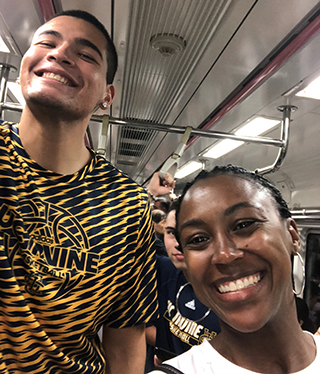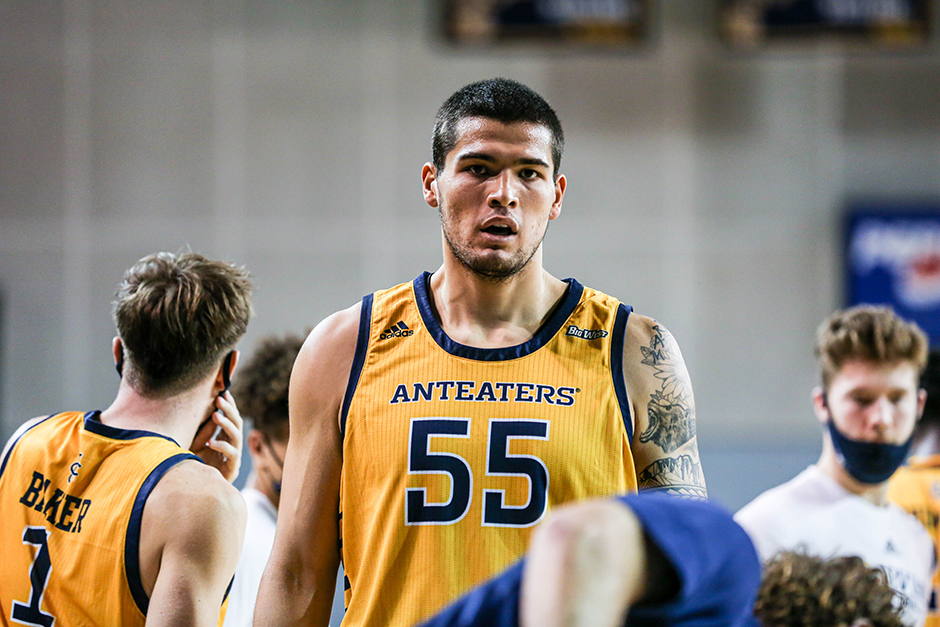Manahuu (Hello) to a bright future
UCI senior Brad Greene greets opportunity with optimism, perseverance and a nod to his Native American heritage

Brad Greene in the Alabama Hills (Sierra Nevada range) near his hometown of Lone
Pine.
Senior Brad Greene has spent much of his life standing out. At 6’11”, he’s decidedly difficult to miss. Then there’s that (considerable) talent he has in basketball, which he’s put in play as an Anteater for four seasons. He’s got tattoos, the inspiration for which he will happily share. But perhaps how Greene stands out the most is via his role in elevating the college experience for fellow Native American students. As he gets ready to graduate in June with a double major in sociology and education, a specialization in children’s learning and development and a minor in anthropology, Greene took time to share how he says manahuu (“hello” in Paiute) to each opportunity that comes his way.
High-desert roots
As a member of the Lone Pine Paiute-Shoshone Tribe, Greene grew up in Lone Pine, California.
His town, nestled between Mount Whitney and Death Valley National Park, is a small,
tightly-knit community where generations of families often live within walking distance
of each other. This was the case for Greene, who grew up next door to his grandparents
and down the street from his cousins. His mother, Marjianne, raised Greene and his
three brothers amongst family and other members of their tribe.
His voice emanates with pride when he talks about his upbringing, but he acknowledges that growing up in a small, geographically isolated community had its drawbacks - specifically when it came to finding college role models for young people to emulate.

Greene with his mentor Alexis McDonald.
“College was never really an idea for me,” Greene says. “Coming from the town I came from, I didn’t know a lot of people who went to college.”
As he grew older, he also grew taller. Greene began to realize that given his size, he possessed a unique opportunity to excel in athletics. He played multiple sports, but his basketball talents quickly set him apart. As a high school student, Greene participated in the Native American Basketball Invitational, an annual event which provides competition, scholarship programs and recruiting exposure for Native American athletes. There, Greene found his footing and developed confidence in his game. As a sophomore, he was getting recruited and realized that playing ball in college was a tangible goal.
When weighing his college options, Greene knew the criteria he was looking for in his campus home: an excellent basketball program with a solid scholarship package, an outstanding academic environment and a welcoming, diverse campus community. When he toured UC Irvine, Greene recalls that he immediately felt comfortable and was drawn to the beauty of the campus as well as the surrounding area. “I just liked how the campus felt as a whole,” says Greene. “The beauty of Irvine and being that close to the beach - coming from the desert - that was a plus.” Soon after his visit, Greene became an Anteater.
A voice to be heard
As a freshman, it was his Introduction to Sociology class that piqued an interest
he would ultimately decide to pursue: race and ethnic studies.
Throughout his studies, his sociology courses have helped him develop his own framework for understanding how racism is experienced differently by varying ethnic groups. Particularly, he’s discovered that in academia, the Native American voice in conversations on race is often absent, misunderstood or marginalized. This under-representation is reflective of many issues, including the dearth of Native American students in higher education, the inadequacy of published research and the lack of coursework centric to the Native American experience.
Greene sees this lack of awareness as an academic gap that desperately needs filled. “As a Native American student, there’s a lot that people don’t understand about us,” he says. “The racism that we face is never really considered.”
Greene would like to be a part of the solution. He sees himself as being in a unique situation to positively influence Native American youth to pursue higher education. “There are not a lot of Native Americans in college because they don’t want to go somewhere they’re out of place or somewhere they’re not familiar with,” he says. By serving as an example to his younger peers, Greene hopes to mitigate some of the fear that young tribal members face when considering college, sometimes as the first in their family to do so. As a guest speaker at NABI, Greene shows his younger peers that there is a place for them in higher education.
Greene would also like to see programs on college campuses to help increase graduation rates for Native American students. Though there are programs to encourage enrollment in higher education among Native Americans, “there is never really that true understanding of what it takes to last in college,” says Greene.
He also wants to play a role in elevating the profile of Native Americans in race-related conversations, whether academically, socially or in the media. Highlighting the importance of leadership from within his community, and the need to develop meaningful conversations that are specific to Native American experiences, Greene wants to help his community develop “a voice to speak for ourselves, rather than being spoken for by parties who don’t know what is going on with us.”
Greene has many people in his corner, including Alexis McDonald, UCI assistant athletic director of academic & student services. McDonald has worked with Greene since his arrival on campus, and has been a source of counsel in academics, athletics and emotional support. “She was always that voice and person I could lean on through the whole experience here. She always had that idea that I was going to be able to succeed in whatever I chose,” says Greene of his mentor.
The respect is mutual, says McDonald. “His dedication to personal growth, athletically and academically, was one that impressed me regularly. In the midst of any obstacle he found the positive and kept himself moving forward,” she says. “My hope for Brad is that he continues to keep his heart big but his dreams bigger and I know he will succeed in all that he puts his mind toward.”

Senior Anteater basketball player Brad Greene is a standout both on and off the court.
Captain of the court
Though his personal and academic accomplishments are impressive, it’s impossible to
write about Brad Greene without talking about basketball. In the 2020-21 season, Greene
racked up 44 blocks, started in all 24 games, and ranked third in rebounds. In March,
he was named the Big West Best Defensive Player, which is the seventh time in nine
years an Anteater has won this award.
One certainly doesn’t have to look far to find fans of Greene’s, but perhaps at the front of the line would be longtime men’s basketball coach, Russ Turner who calls Greene “one of his all-time favorite Anteaters.” Turner was quick to outline Greene’s accomplishments in the basketball program with pride, but when asked about the player on a personal level, Turner conveyed a level of respect that clearly goes beyond the paint.
“The captain amongst the players is the tone-setter. Brad earned the opportunity to be elected to that job by his teammates,” says Turner. “In the most difficult year we’ve ever had in college basketball, to maintain positivity on the team, to generate energy each day, when there were more distractions this year than any other time... he had probably the hardest job a captain has ever had, and he attacked it with outstanding vigor,” Turner says.
His high expectations of Greene don’t end with basketball. When asked about his thoughts on Greene’s future, Turner points to Greene’s desire to be either a teacher or a coach. “I expect he’ll be a demanding version of one of those things - who really pushes to get a lot out of others the way he’s gotten a lot out of himself.”
I feel like any opportunity is a great opportunity.
A future in leadership
Greene honors his experiences and heritage with a collection of tattoos emblazoned
on his arms. He says these tattoos represent “who I am and where I come from,” including
mountains for where he grew up, flowers for his grandmother and his mother’s name,
in appreciation of “who she is and what she’s meant in my life.” Greene laughs when
he recalls how, before he got his first tattoo, his mom told him that his inaugural
ink had to say “mom” or have her name on it. Nicely done, Marjianne.
Looking forward, Greene wants to play basketball “as long as possible.” He hopes to play professionally, whether in the U.S. or abroad. He’s currently pursuing his professional options and has his sights set on playing ball for the foreseeable future.
Greene’s plans after basketball include possibly coaching or teaching, while staying connected to and continuing to serve his Native American community. He hopes that the path he’s forged will make it easier for those following in his footsteps to find success in college, and that those successes will collectively elevate the Native American voice on a national level.
Regardless of where he ends up, Greene is ready to embrace his next chapter with enthusiasm and optimism - a framework through which he seems to view all aspects of life.
“I feel like any opportunity is a great opportunity. Making the most of whatever you’re given - just being happy wherever you’re at, whatever you’re doing - I believe in making the most out of everything.”


connect with us: